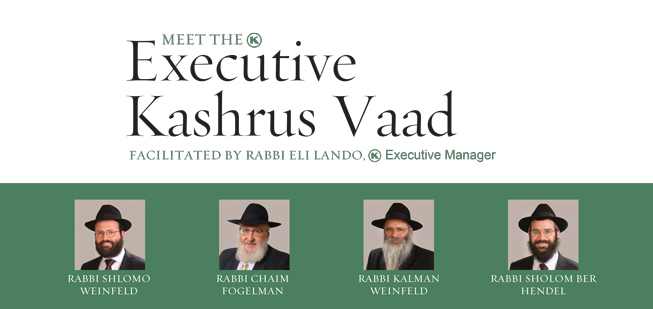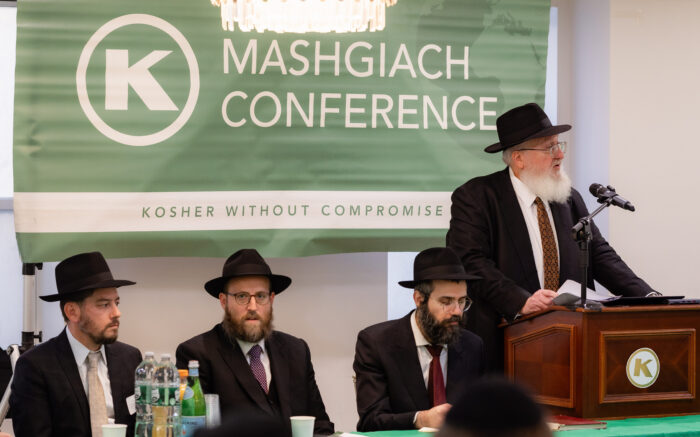Acharon Shel Pesach 5781 will mark the yahrzeit of Rabbi Don Yoel Levy, OB”M. During his 40 years of leadership, Rabbi Levy took the OK to great heights, and the standards he established are the guiding principles of our organization, now and into the future. With incredible foresight, Rabbi Levy spent years appointing rabbinic and laypeople to all key areas of responsibility within the OK. The Executive Kashrus Vaad (Rabbinical Council) has been in the role of maintaining and further developing the kashrus standards of the OK for the past year. Kosher Spirit has asked Rabbi Eli Lando, OK Kosher Executive Manager, to sit down with the Vaad for a panel discussion to be shared with you, the Kosher Spirit readers.
The Lubavitcher Rebbe, ztz”l, describes a unique aspect of Acharon Shel Pesach that we don’t find with any other day of Pesach. The first two days of Pesach consist of one day that is Yom Tov in both Eretz Yisroel and the Diaspora, and a second day which is Chol HaMoed in Eretz Yisroel and Yom Tov in the Diaspora. By contrast, Acharon Shel Pesach is essentially a regular chol day for Eretz Yisroel that is completely transformed into a Yom Tov for the diaspora. According to the directives of the Baal Shem Tov and the Chassidic teachings, this special day is focused on and represents a foretaste of Moshiach and the coming Geula. Rabbi Levy completed his shlichus in this world during the time of Seudas Moshiach, on this special day of Acharon Shel Pesach. Rabbi Levy’s constant approach was to add kedushah over chol in all areas of life. Continuing in his footsteps, I’d like to introduce the Executive Kashrus Vaad to our readers.
RABBI SHLOMO WEINFELD is the Chairman of the Executive Kashrus Vaad. He is a musmach of the late Chief Rabbi of Montreal, Rabbi Yitzchok HaCohen Hendel, OB”M, Rav Dovid Refael Banon shlit”a, and Rav Chaim Shlomo Cohen, shlit”a.
RABBI CHAIM FOGELMAN is the Director of Communications and Education – and the spirit behind Kosher Spirit. He is a musmach of Rabbi Yisroel Piekarski, OB”M, and Rabbi Zalman Labkowski, shlit”a, trained in shechita under Rabbi Yisroel Shimon Kalmenson, OB”M, and received official Kabbola from Rabbi Pinchas Hirshprung, OB”M, and Rabbi Yitzchok Yehudah Yeruslavksi, shlit”a.
RABBI KALMAN WEINFELD is the Vaad Poskim Liaison and Director of Food Service certifications and Rav of Beis Eliezer Yitzchok Shul. He is a musmach of Rav Moshe Halberstam, OB”M, of the Eida HaChareidis, as well as the Nitra Rav, Rav Menachem Meir Weissmandl, shlit”a, and Rabbonei Chabad in Israel.
RABBI SHOLOM BER HENDEL is the Executive Rabbinic Coordinator of the OK. He is a musmach of Rav Avrohom Tzvi Wosner, shlit”a, and Rav Yeruslavski, shlit”a, and trained at the OK under Rabbi Dovid Steigman, OB”M.
REL: Please share with our readers a highlight of your relationship with Rabbi Levy.
RSW: I’ve known Rabbi Levy my entire life, as he was my uncle. My relationship with him goes deeper than our kashrus work together. While I studied in New York, I spent much time in his home. During this time, I couldn’t help but notice that Rabbi Levy had a very strict schedule. He would awaken in the early hours of the morning to prepare shiurim and get ready for his day at the OK. I learned a derech – an approach – of how a Rav, a leader, should conduct himself. Rabbi Levy was a giant of a leader in kashrus, yet he cared for people on a very personal level.
RCF: As Rabbi Levy’s son-in-law, he and I had a unique relationship. I worked alongside him for the last 28 years. Rabbi Levy had a tremendous amount of emunah and bitachon in his day-to-day life. He used to tell me, “We must do all that we can do to do things right and with Hashem’s help, we will succeed.”
RKW: On a personal level, I have a lot of memories with Rabbi Levy [also RKW’s uncle – Editor]. I always noticed his sensitivity towards other people’s needs. As the Rav of his shul Beis Eliezer Yitzchak, Rabbi Levy took care of his kehilla as well as any guests in a very personal way. His chesed was a quality that was known around the world, as he provided for the needs of many people and projects that came to his doorstep.
RSBH: I worked under Rabbi Levy for over ten years. As a general picture of the way he approached kashrus, I’ll share this. Rabbi Levy had an incredible amount of Yiras Shomayim and he felt a huge achrayus for the products we certify. Professionally, he was always demanding in the area of standards, and emphasized growth and improvement to kashrus. On a personal level, he was an incredibly caring man, and his kind nature shone through in his approach as a leader.
REL: What are the functions and responsibilities of the Vaad, and what types of decisions do you make?
RSW: The Vaad was established as the rabbinic body responsible for governing the kashrus standards on behalf of the OK. Rabbi Don Yoel Levy, OB”M, and his father, Rabbi Berel Levy, OB”M, devoted their life’s shlichus to establishing and developing the ~’s high standards. They became legendary in the world of kashrus for raising the bar across other agencies as well. The Vaad is now fortunate to have inherited the wealth of experience and documented procedures they left behind. This is in addition to a large and capable staff of full-time, in-house Rabbinic Coordinators, and hundreds of mashgichim worldwide, who carry out these standards in their work. The Vaad is structured to support and lead these rabbinic efforts. Each member of the Vaad has specific areas of responsibility, and we work together in creating policy and addressing the higher-level questions and decisions that come up. The OK works in a very organized way.
RCF: The Vaad functions like a presidential cabinet; the whole is greater than the sum of its parts. Together, the Vaad members have decades of kashrus experience. The advantage of working together is that we are always collaborating on issues that arise on a daily basis. We consult with our external Poskim for review, with the idea that a third party is completely objective. This was the way Rabbi Levy made decisions, and we follow suit.
The Vaad, Boruch Hashem, works very well together. The members of the Vaad don’t just see kashrus as their day job; like Rabbi Levy, this is our collective mission in life. Rabbi Levy demanded a lot from the people who worked with him, but never anything that he didn’t demand from himself. That’s an important point. Anyone who worked under Rabbi Levy learned that we have to do the right thing, not the easy thing! On the verse “Hashem Nitzav Be’Adas Keil” Chazal says that Hashem is with the Dayanim at the time of judgment and we see Hashem’s Hand in everything that we do.
REL: The OK is making great strides and enhancing many of our internal systems. Each member of the Vaad has his area of expertise, and you truly run like a well-oiled machine. What does working together mean to you?
RSW: There is a clear division of responsibilities. The Vaad works together in that each one knows his focus, yet we make all decisions as a group. Underlying it all, we have one goal in mind: to ensure that every product we certify meets the OK’s kashrus standards and is kosher without compromise.
RCF: Chassidus certainly explains it. A person needs to know both his strengths and his shortcomings. Each person brings his specialty to the table and we are all focused on the same goal of enhancing kashrus worldwide.
RKW: I would say Perek 32 in Tanya says it – you know you have one mission. We are truly involved in a shlichus together. The siyata d’shmaya that Rabbi Levy had, and the brochos from the Rebbe, are continuing stronger than ever in this Vaad.
RSBH: I agree. It’s Hashem’s help and having one common goal. Our mission is to enhance kashrus and expand kashrus worldwide.
RCF: The siyata d’shmaya is not just luck. We do our hishtadlus and make a keili, then the outcome is up to Hashem. We try our very best to make sure we are fulfilling our mission and, Boruch Hashem, we have been blessed with siyata d’shmaya. It should continue, b’ezras Hashem.
REL: What is the procedure for shaalos to the Poskim?
RKW: If I have a question from a Rabbinic Coordinator or Vaad member, I take it to one of our Poskim. First, I spend due time with the Rabbinic Coordinator or another relevant party, to fully understand the matter on both the Halachic and practical sides. Only then do I go and speak to the Posek. After discussing the issue thoroughly, and getting the answers, I write up the teshuva and ask the Posek for corrections and comments so that we have each answer accurately detailed in writing.
REL: What do you feel makes a reliable kosher agency?
RSBH: A reliable kashrus agency is one that has trustworthy, well-trained mashgichim, good reporting systems in place, and uses those systems properly. The agency needs to be fully on top of the raw materials going into each product. Most importantly, however, what defines a good agency is that the inevitable, human mistakes are not pushed under the rug. If something happens, the issue is carefully reviewed and dealt with. It’s a matter of transparency as well. Good Rabbinic Coordinators, with years of experience, who are experts in their field address any questions that come their way. The OK employs a large team of great talmidei chachamim who have vast experience in all aspects of Halacha and related kashrus systems as well as the practical understanding that comes from years of visiting production facilities.
RCF: Good intentions, high standards, and transparency are all part of creating a reliable hechsher. A good hechsher must also have the manpower and mechanisms to enforce the high standards and implement the required policies.
REL: What is the Vaad’s relationship with Mashgichim?
RCF: The Vaad is here to support mashgichim and to give them the tools to be the best eyes and ears on the ground. For about 20 years, we’ve held an annual, international OK Mashgichim Conference (held virtually this year over 3 days). This is an opportunity for us to present new information, enriching presentations, and catch up personally with every mashgiach. It’s an event that we all look forward to, and a form of professional growth and development. We are also in the final stages of authoring our Mashgiach Manual, with the help of our Rabbinic Manager, Rabbi Levi Marmulszteyn and HQ Mashgiach Liaison, Rabbi Sruly Karasik, who is constant contact with our mashgichim.
REL: Can you share some concrete examples of questions or topics the Vaad has addressed over the past months?
RSBH: One topic of consideration is the discussion of kosher certification of keilim concerning their requirements of tevila. We are also in the midst of research on lab-grown meat, which is a relatively new development in the world of food production. The main question is regarding whether it’s kosher and, further, whether it’s halachically meat or pareve. Finally, the OK can proudly say that we have continued to make all Initial Inspection Visits for new companies in person, despite the pandemic. This means we ended up turning away companies that would not accommodate an in-person rabbinic visit.
REL: What’s on the agenda for the coming years?
RSW: Of course, our primary goal is to continue upholding the OK standard of kashrus without compromise. Rabbi Chaim Fogelman has mentioned that he devotes much of his time and effort to kashrus education. There is currently a great need for this. For instance, there are certain types of products that many people believe pose no kosher concern. However, this is due to a lack of awareness. We are planning to create resources and programs for educating the public on important kashrus topics. In my role as Chairman of the Vaad, I plan to collectively work with my peers on the Vaad to ensure that the OK retains and grows our rabbinical staff and devotes time and effort to researching new developments so that we’ll always be prepared for the constant innovations in the industry.
REL: Pesach is the Yom Tov that we all focus intrinsically on the kashrus as well as the simcha. Kosher is at its core. We would like to wish the Chavrei HaVaad and our readers a kosher and freilichen Pesach. We at the OK will continue devoting ourselves to making kosher products available to the consumer with adherence to the highest level of kosher. May we merit to see Moshiach Tzidkeinu right away and unite with all our loved ones, including Rabbi Levy.


 EN
EN  ZH
ZH  KR
KR  BR
BR  ES
ES  IN
IN  IL
IL 




